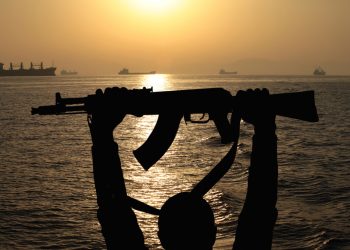A pirate has often
 Europe is not doing enough to fight back against Somali pirates and the tragedy is being felt at both a human and economic level. The European Union should fight piracy by all necessary means. The current approach to piracy is insufficient. It is time for a more effective approach to a rapidly growing problem. Last week, Georgios Koumoutsakos MEP and I organised a hearing on piracy in the European Parliament. Speakers from the Polish EU-Presidency, the International Maritime Organisation, the European External Action Service, the European Naval Force Somalia and the European Communities Ship-owners´ Association underlined that the problem of piracy is not solved – but is, in fact, growing.
Europe is not doing enough to fight back against Somali pirates and the tragedy is being felt at both a human and economic level. The European Union should fight piracy by all necessary means. The current approach to piracy is insufficient. It is time for a more effective approach to a rapidly growing problem. Last week, Georgios Koumoutsakos MEP and I organised a hearing on piracy in the European Parliament. Speakers from the Polish EU-Presidency, the International Maritime Organisation, the European External Action Service, the European Naval Force Somalia and the European Communities Ship-owners´ Association underlined that the problem of piracy is not solved – but is, in fact, growing.
In the first nine months of 2011, as many ships and seafarers were hijacked near Somalia as throughout the whole year of 2010. And while the real “hunting season” has yet to begin this year, the monsoon has just ended. Not only are the coastal waters off Somalia dangerous, but the entire Indian Ocean between India and Mozambique is a haven for thousands of pirates.
The average time to reach agreement on a ransom is one year. And the ransom price has risen sharply, from several million United States dollars to about $6-12m per ship. Piracy is, therefore, very profitable. After a “career” of five years, a pirate has often “earned” more than $200,000. By comparison, the general population in Somalia lives on less than$1 per day. In total, about 3,000 seafarers have been held hostage since 2008, and 60 of them died. At the moment, between 450-600 seafarers from more than 30 ships are being held hostage in Somalia. This is a human disaster for them and their families. The EU should try to liberate these people as soon as possible, from this horrifying situation.
Apart from the human part of the problem, there is an economic problem as well. Maritime transport is one of the biggest industries in the world. Every year, 10.000 European ships with high value goods go through dangerous maritime areas. It is unacceptable that pirates hijack these ships. The pirates threaten the life-line of international trade.
It is important that member states continue to escort ships, with European naval ships, through the dangerous waters. This cooperation should be extended and enlarged. I also believe all European countries should allow their ship-owners to hire armed certified personnel on board the vessels. Ship-owners are obliged to safeguard their ship, crew and goods. In the current circumstances, it is impossible to do that without extra armed personnel. The EU-Atalanta mission does great work, but it cannot guarantee security across the entire Indian Ocean. The problem has become too large in recent years. Ships need armed personnel on board and European countries should allow that.
Last but not least, European countries should investigate where the money – which is paid as ransom to the pirates – flows to. It is estimated that the total sum of money paid is already approaching 300-500m. There are indications that this money goes to Somalian warlords, who put the money in bank accounts sometimes in European countries. This money should be traced and confiscated so piracy is no longer an attractive business. I will try to convince other political groups of the seriousness of this growing problem. But the EP should make new arrangements soon with EU High Representative Catherine Ashton, to combat piracy more effectively.
Source: Public Service Europe, Peter van Dalen
































































